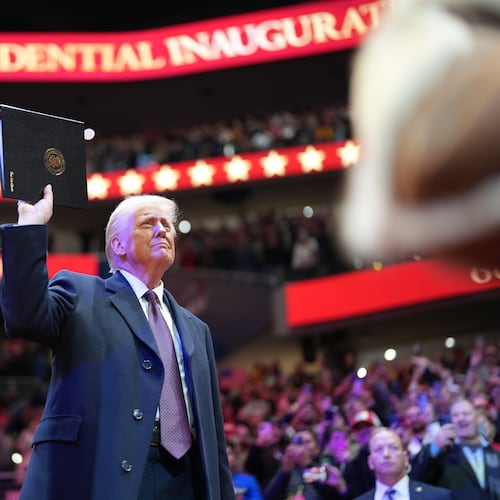Georgia’s new election rules could face more legal scrutiny after the nation’s top law enforcement officer pledged to review state laws that could limit the right to vote.
U.S. Attorney General Merrick Garland promised Friday to scrutinize a series of state laws passed in the wake of the November election. He also pledged to examine post-election audits such as the kind being sought in Georgia and to investigate threats against state and local election workers.
To aid those efforts, he said the Justice Department would double the size of its voting rights enforcement staff in the next 30 days.
Though Garland did not single out Georgia, the state’s new election law likely will be a target of the review. It’s already drawn a slew of lawsuits that claim it illegally discriminates against voters of color.
“There are many things open to debate in America,” Garland said in a televised speech in Washington. “But the right of all eligible citizens to vote is not one of them.”
Garland’s comments are just the latest evidence that the fallout from the November presidential election continues. Former President Donald Trump has claimed for months that Joe Biden won because of widespread fraud.
Those claims have not been proven through numerous recounts, audits, investigations and lawsuits. But they inspired the Jan. 6 attack on the U.S. Capitol, and numerous laws have followed imposing stricter voting rules in Republican-controlled states.
Among other things, Georgia’s law would impose new identification requirements for absentee ballots, restrict the use of ballot drop boxes and allow the State Election Board to take control of local election offices that fail to meet standards.
Critics have likened Georgia’s new election statute, Senate Bill 202, to the Jim Crow laws that made it harder for Black citizens to vote for nearly a century after the Civil War. Supporters of SB 202 say it is not discriminatory. They say comparisons to Jim Crow are offensive and designed to motivate Democratic voters in future elections and to rally support for legislation that would overturn many of the new Republican voting rules.
On Saturday, Georgia Gov. Brian Kemp and Attorney General Chris Carr issued a joint statement welcoming “an honest and fair look at our election law.” But they also condemned the Biden administration for parroting “false, inflammatory rhetoric about the Election Integrity Act to line the pockets of left-wing interest groups and ram their unconstitutional elections power grab through Congress.”
On Friday, Garland said the Justice Department would conduct its own review to determine whether state laws illegally discriminate against Black and brown voters. He said the department would also examine disparate treatment of minorities — such as claims that minority voters wait in longer lines than white voters, as one recent investigation found in Georgia.
The state’s new law addresses long lines, requiring local officials to monitor precinct wait times. If the wait is more than an hour in a general election, they must reduce the number of voters assigned to that precinct to no more than 2,000.
Garland said the department also would review post-election audits to ensure they follow federal laws. Republicans in Georgia are calling for such an audit, which could come through a lawsuit filed in Fulton County Superior Court.
The attorney general also pledged to investigate threats against election officials, which he said “undermine our electoral process and violate a myriad of federal laws.”
On Friday, Reuters reported that Tricia Raffensperger, wife of Secretary of State Brad Raffensperger, received text messages in April saying “you and your family will be killed very slowly.” The report also cited ongoing threats against officials in Fulton County and other Georgia counties.
About the Author
The Latest
Featured



